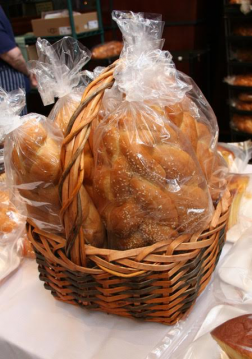Our family is in the process of moving, so I figured this would be a great time to focus on new home and moving traditions in Judaism.
The first thing I think of when I think of a Jewish home is the mezuzah. It’s the small tube that hangs on the door frames of every door except for the bathroom. Inside you’ll find a scroll bearing the first two paragraphs of the Shema, the prayer considered the watchword of Judaism. We kiss our fingers and touch the mezuzah when we come and go. Some non-Jews think it’s a good luck charm, but it’s really not. It serves to remind us to behave Jewishly both out in the world and at home with our family. It’s one of the first things we put up when we move into a home. When you live in a Jewish neighborhood, it’s traditional to leave a mezuzah behind if you move. We’ve never sold a house to Jews, so we always take ours with us.

One custom is to bring bread and salt when first entering the home. Often the homeowners bring those in themselves. It’s also common for Jewish friends to give the new homeowners challah and salt as a gift when they come to visit. I’ve always heard this is so the owners never know hunger and their lives always have flavor. Bread is required for many things in Judaism. A meal is not considered a meal unless bread is eaten. Challah and salt are a ritual part of Shabbat. When we bring bread and salt, we can truly have a Jewish home where Motzi (the blessing before meals) is said and Shabbat is celebrated. There are also far more philosophical and religious reasons related to history and excerpts from Torah. Some visitors also include something sweet in the gift basket along with bread and salt. This is often sweet baked goods or wine. Wine too is a necessary part of Shabbat. In addition, the idea is that, in bringing something sweet, the family and home will always know sweetness.
There’s special consideration for Jewish books when packing. Certain books are to be handled very carefully. There are particular and delicate ways to package them. You can’t just pack them in with other books. You can’t let them be tossed in the bottom of a moving box. So special consideration needs to be taken when packing and then transporting them.
Moving dates can be tricky. There are many days where the work associated with moving is prohibited. This includes Shabbat which happens every week and other holidays which pop up throughout the year. I’ve also heard that Tuesday is the best day for moving. In Bereshit (Genesis) Torah includes the phrase, “and G-d saw that it was good,” twice on the third day of creation. It’s the only day that uses the phrase more than once. In the Jewish calendar, that’s Tuesday. So Tuesdays are considered particularly good days for important things like weddings and moving.
There’s no special bracha (blessing) for moving to a new home, but the Shehecheyanu is a blessing of thanksgiving and is often recited in a new home. It thanks G-d for granting us life, sustaining us, and allowing us to reach this season.






